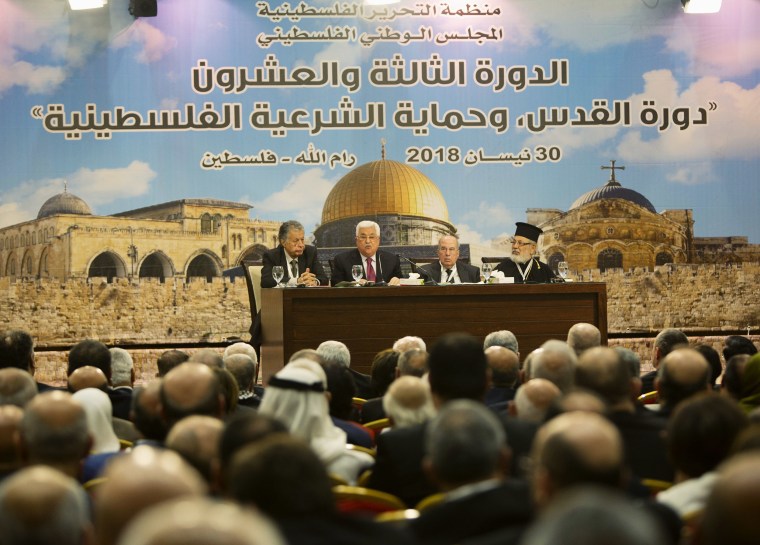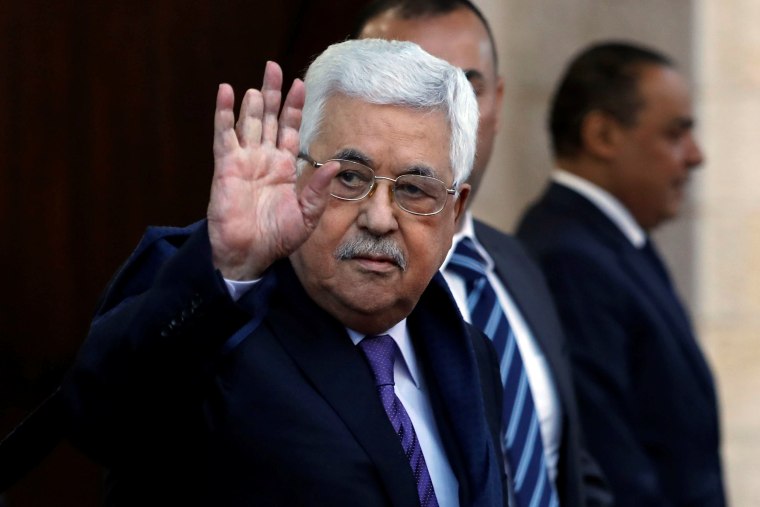JERUSALEM — Palestinian President Mahmoud Abbas offered an apology on Friday after he was accused of anti-Semitism for suggesting that historic persecution of European Jews had been caused by their conduct, not by their religion.
Abbas condemned anti-Semitism and called the Holocaust the "most heinous crime in history" in a statement issued by his office in Ramallah after a four-day meeting of the Palestinian National Council, at which he had made the remarks.
"If people were offended by my statement in front of the PNC, especially people of the Jewish faith, I apologize to them," Abbas said in the statement.
"I would like to assure everyone that it was not my intention to do so, and to reiterate my full respect for the Jewish faith, as well as other monotheistic faiths."
The remarks made by Abbas, who the Palestine Liberation Organization affirmed as its unchallenged leader in a convention that ended Friday, were sharply criticized as anti-Semitic and drew widespread condemnations from Israel and around the world earlier this week.

In rambling remarks that were part of a lengthy speech to the PLO parliament on Monday, Abbas cited books written by various authors to claim it was the Jewish peoples' "social function," including money lending, that caused animosity toward them in Europe. He also portrayed the creation of Israel as a European colonial project, saying "history tells us there is no basis for the Jewish homeland."
The comments drew criticism that Abbas, 82, perpetuated anti-Semitic stereotypes and ignored the deep Jewish historical connections to the Holy Land.
Israeli Prime Minister Benjamin Netanyahu said Abbas' remarks were "the pinnacle of ignorance" and that the Palestinian leader was "again reciting the most disgraceful anti-Semitic slogans."
U.N. Middle East envoy Nickolay Mladenov called Abbas' comments "deeply disturbing."
The U.S. ambassador to Israel also lashed out at Abbas over his remarks.
"Abu Mazen has reached a new low," Ambassador David Friedman tweeted, referring to Abbas by his nickname. "To all those who think Israel is the reason that we don't have peace, think again."
The rhetoric reflects the escalating tensions between the Palestinians and the Trump administration. Ties have been strained since President Donald Trump recognized Jerusalem as Israel's capital last year, prompting the Palestinians to suspend contacts with the administration. The U.S. plans to move its embassy in Israel from Tel Aviv to Jerusalem by mid-May.
In response to Abbas' apology on Friday, Israeli Defense Minister Avigdor Lieberman tweeted: "Abu Mazen is a poor Holocaust denier who wrote a doctorate on Holocaust denial and later published a book on Holocaust denial. This is how he should be treated. His apology is not accepted."
A veteran member of Fatah, the PLO's dominant faction, Abbas served for decades as a loyal deputy of his predecessor, Yasser Arafat. He assumed the leadership of Fatah, the PLO and the Palestinian Authority after Arafat died in 2004, and was re-elected as chairman of the PLO's Executive Committee on Friday.
This is not the first time he has been accused of anti-Semitism. In 1982 Abbas obtained a doctorate in history at the Moscow Institute of Orientalism in the then-Soviet Union. His dissertation, entitled "The Secret Relationship between Nazism and the Zionist Movement," drew widespread criticism from Jewish groups.
The following year the Simon Wiesenthal Center released translated quotations from the book, including one excerpt about World War Two in which, according to the center's translation, Abbas wrote:
"Following the war...word was spread that six million Jews were among the victims and that a war of extermination was aimed primarily at the Jews...The truth is that no one can either confirm or deny this figure. In other words, it is possible that the number of Jewish victims reached six million, but at the same time it is possible that the figure is much smaller — below one million."
The fresh accusations of anti-Semitism come during a particularly low point for Abbas and his elusive goal of negotiating the terms of Palestinian statehood with Israel. The political camp led by Abbas seeks a state in the West Bank, Gaza Strip and east Jerusalem, lands Israel captured in the 1967 Mideast war.
Prospects for resuming negotiations with Israel after a decade of diplomatic paralysis are close to zero — at a time when Israel's rightist government and the Trump administration pursue policies Abbas considers to be deal breakers.
At the same time, Abbas' bitter rivalry with Hamas has flared up again in recent weeks, making Palestinian reconciliation extremely unlikely.

